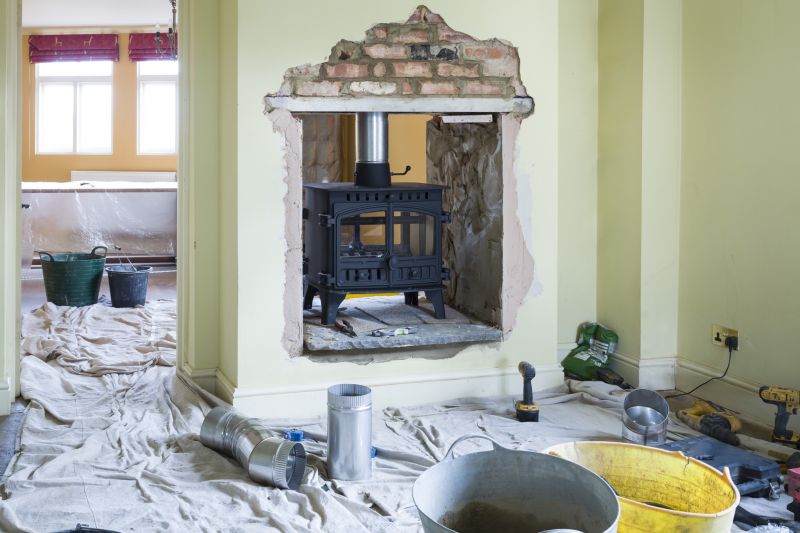Leading Products For Wood Stove Installations To Maximize Safety and Functionality
Find out which high-quality tools and accessories are recommended for a secure and efficient wood stove setup.
 Installing a wood stove requires careful selection of the right products to ensure safety, efficiency, and durability. From the initial setup to ongoing maintenance, a variety of specialized components are essential for proper installation. These include heat-resistant materials, secure mounting hardware, and effective venting solutions. Choosing quality products tailored to your specific stove model and space can help create a safe and functional heating environment.
Installing a wood stove requires careful selection of the right products to ensure safety, efficiency, and durability. From the initial setup to ongoing maintenance, a variety of specialized components are essential for proper installation. These include heat-resistant materials, secure mounting hardware, and effective venting solutions. Choosing quality products tailored to your specific stove model and space can help create a safe and functional heating environment.
Top Overall Option
High-Temperature Stove Pipe
A high-temperature stove pipe is a critical component for venting smoke and gases safely from your wood stove. Designed to withstand extreme heat, these pipes are usually made from durable steel or stainless steel with heat-resistant coatings. Properly installed, they help ensure efficient draft and safe exhaust flow, reducing the risk of smoke leaks or fire hazards. Selecting a high-quality stove pipe suited to your stove's specifications can contribute to a reliable and safe installation.
Types of Products For Wood Stove Installations
Chimney Pipe
Flexible or rigid pipes designed to connect the stove to the chimney, facilitating exhaust venting.
Wall Pass-Throughs
Specialized fittings that allow vent pipes to pass through exterior or interior walls safely.
Hearth Pads
Heat-resistant surfaces that provide a stable and safe base for wood stoves.
Sealing Gaskets
Materials used to seal joints and connections, preventing smoke leaks and improving safety.
Support Brackets
Hardware that secures vent pipes and components to prevent movement or dislodgement.
Heat Shields
Protective panels that shield walls and furniture from excessive heat exposure.
Storm Collars
Fittings that seal around the chimney pipe where it passes through the roof or wall, preventing water intrusion.
Roof Flashings
Weatherproof fittings that seal the area where the chimney exits the roof.
Insulation Materials
Insulation to reduce heat loss and improve safety around venting components.
Ash Baskets
Containers designed to safely collect and remove ashes from the stove.
Firebricks
Refractory bricks that line the interior of the stove for heat retention and protection.
Damper Controls
Devices that regulate airflow and combustion within the stove for efficient operation.
Thermocouples
Temperature sensors that monitor stove heat levels for safety and efficiency.
Gasket Kits
Complete sets of gaskets for sealing doors and panels securely.
Venting Kits
Complete packages that include all necessary components for venting installation.
Popular Choices
A versatile liner that fits inside existing chimneys to improve venting efficiency.
Connecting pieces that facilitate secure attachment between stove and vent components.
High-temperature sealants used to secure joints and prevent leaks.
Caps installed at the top of the chimney to prevent debris and pests from entering.
Protective surfaces that provide a safe base for wood stoves in various room settings.
Metal fittings that allow safe passage of vent pipes through walls.
Devices that allow precise control of airflow within the stove or venting system.
Protects the chimney opening from sparks and debris while allowing proper ventilation.
Special bricks that withstand high temperatures and protect the stove interior.
Devices to monitor stove temperature for safe operation.
Hardware for securing vent pipes and chimney sections in place.
Pipe with insulation to reduce heat loss and improve draft efficiency.
High-temperature tape used to seal joints and connections securely.
Tools designed for safe and efficient ash cleanup from the stove.
Gaskets that ensure a tight seal around stove doors for safe operation.
Proper installation not only enhances the performance of your wood stove but also minimizes potential hazards such as smoke leaks or fire risks. It is important to consider the compatibility of each component with your existing structure and the local building codes. Many products are designed to withstand high temperatures and corrosive conditions, ensuring long-term reliability.
Whether you're installing a new stove or upgrading an existing setup, understanding the different types of products available can simplify the process. From flue pipes and chimney connectors to hearth pads and sealing materials, each element plays a crucial role in the overall system. Investing in quality components can lead to better heat distribution, easier maintenance, and increased safety for your household.
Key Buying Considerations
- Compatibility with your specific wood stove model and size.
- Material durability, especially heat resistance and corrosion protection.
- Ease of installation and whether additional tools or skills are required.
- Compliance with local building codes and safety standards.
- Proper venting options suitable for your home's structure.
- Ease of maintenance and accessibility for cleaning and repairs.
- Weatherproofing features such as caps and flashing for outdoor venting.
- Material thickness and insulation properties for efficiency.
- Availability of replacement parts and accessories.
- User reviews and recommendations for reliability and performance.
- Cost and overall value considering quality and longevity.
- Design features that facilitate safe operation and heat distribution.
- Compatibility with existing chimney or venting infrastructure.
- Presence of safety features such as dampers or thermometers.
- Brand reputation and warranty options.
This content contains affiliate links. We may earn a commission if you make a purchase through these links, at no additional cost to you.
